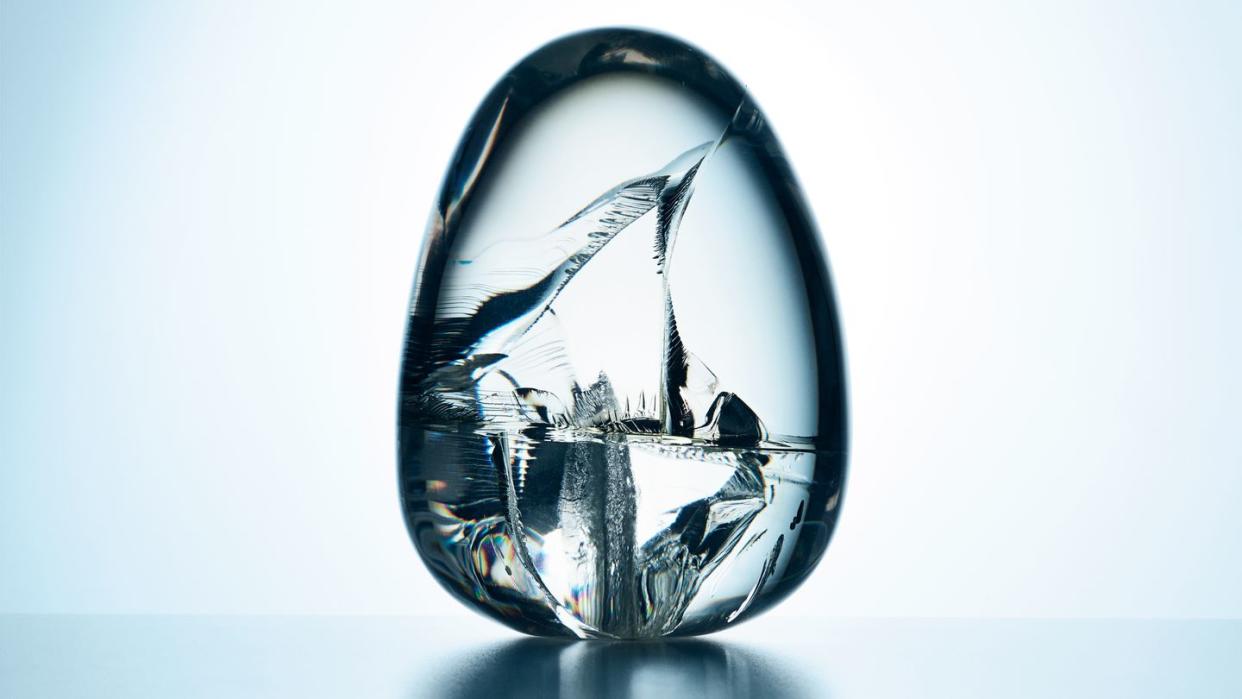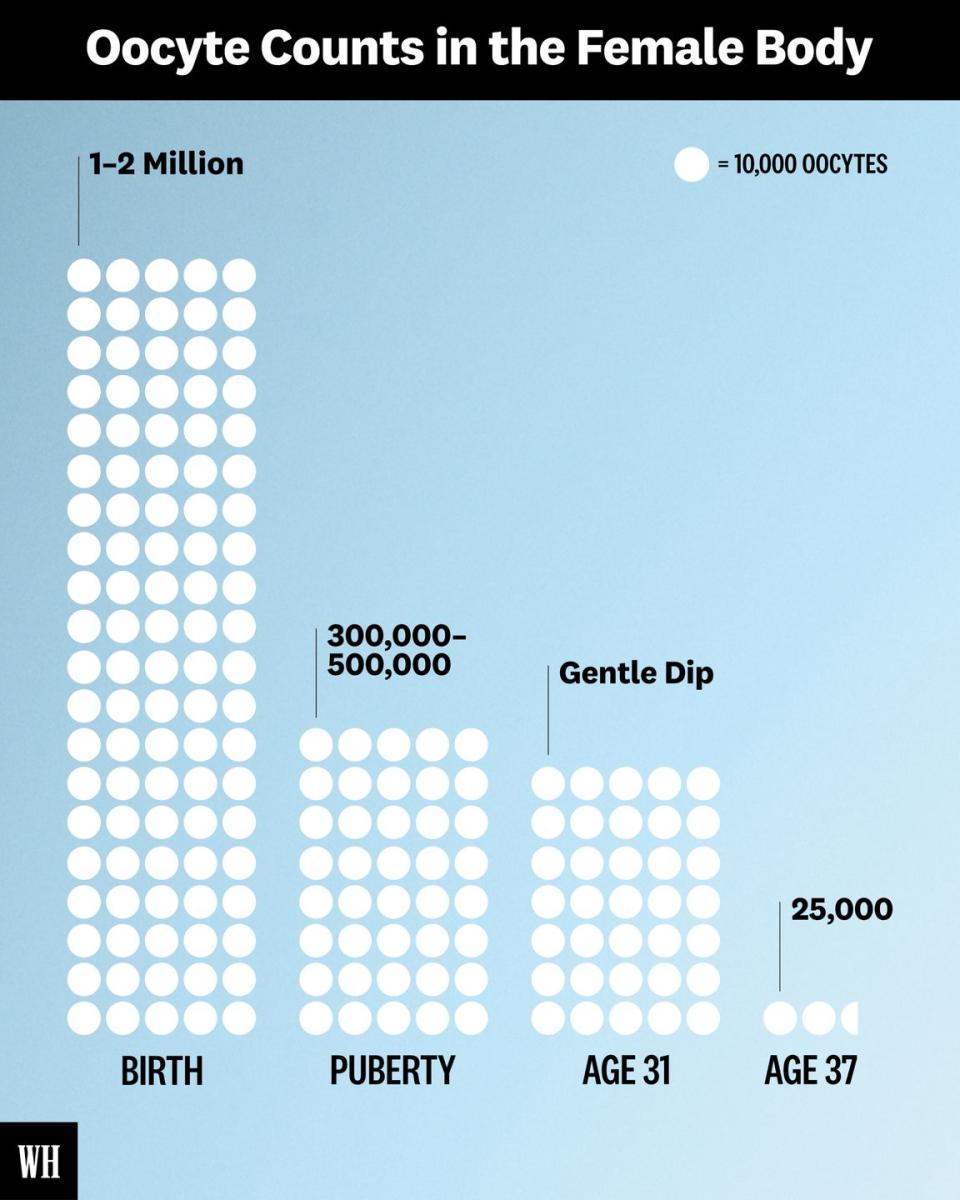Gen Z Is Panicking About Their Fertility. Should They Be?

"Hearst Magazines and Yahoo may earn commission or revenue on some items through these links."
A year and a half ago, Shania Bhopa’s sister looked at her from across the dinner table and asked, “Have you ever thought about freezing your eggs?”
“I was so caught off guard,” Bhopa, 25, says. But her sister is 10 years older and a physician, so she took the question seriously. Bhopa’s sister told her that she should consider preserving her fertility given her ambitions for the future. If all went according to Bhopa’s aspirational career plan—she had just started a PhD program for global health, was running a charity for youth experiencing homelessness, and hoping to create multiple companies focused on empowering women and girls—she would likely want to delay possible parenthood until her mid-30s.
And even though Bhopa was in a loving relationship, she, like many 25-year-old Gen Z-ers, didn’t plan to get pregnant anytime in the near future.
For a few months, Bhopa thought deeply about her sister’s advice. She listened to stories of women who had trouble conceiving in their mid- to late 30s. She researched fertility and learned that egg count declines as you hit each new decade. And as her mind went through each potential pregnancy age, her anxiety grew.
“I want to have kids around 35, and probably no earlier,” Bhopa says. “But what happens if I don’t start trying right at 35 and instead start at 36.5? At that stage in your life, [I believe] a year and a half makes a big difference.”
Finally, when she realized she’d be kicked off of her parents’ insurance when she turned 26, Bhopa decided it was now or never. With her parents’ coverage, she could afford the approximately $7,500 egg-freezing bill—which included prescribed hormone medications, egg-retrieval surgery, and storage (all of which can cost upwards of tens of thousands of dollars, depending on your provider and where you live). She decided to go for it.
In February 2023, Bhopa began self-administering stimulating hormone medicine like Gonal-F, Luveris, and Orgalutran to help her ovaries produce as many follicles (which contain immature eggs) as possible before the procedure. In late March 2023, Bhopa went into surgery for her first egg retrieval. Doctors retrieved about 25 eggs—more than double the amount of the average retrieval, per a 2023 study in the Journal of Clinical Medicine. (On average, women are around 38.3 years old when they decide to do an egg-retrieval surgery to preserve their fertility, at which time their egg counts are often lower, per a 2022 New York University Langone Fertility Center study.) After the procedure, the eggs were put into storage, where they’ll sit for about a decade before Bhopa plans to use them.
It’s been just over a year since she froze her eggs, and she says she would still make the same choice if she had to do it all over again. “To me,” Bhopa says, “there are no drawbacks.”
For Gen Z, fertility anxiety is trending.
While 25 might feel young to freeze your eggs or even be concerned about your fertility, Bhopa isn’t alone. Previous generations tended to wait to address their fertility until they were ready for children, but nearly half of Gen Z is worried about their fertility despite not currently trying to conceive, according to a 2023 survey from HRC Fertility. And nearly half of young people ages 16 to 24 also have “fertility anxiety,” per a study from U.K.-based fertility benefits company Apryl.
Gynecological fertility specialists have seen an uptick in Gen Z patients coming into their offices for fertility testing or full-on freezing in the past couple of years. “I do a lot of egg freezing for people of all ages, but I have a ton of people in their mid- to late 20s egg freezing [right now],” explains Allison K. Rodgers, MD, a doctor of obstetrics, gynecology, and reproductive endocrinology at Fertility Centers of Illinois.
Though it seems that Gen Z is being proactive about their fertility concerns, wanting to get ahead of any potential speed bumps, fertility planning is very nuanced. And early preparation isn’t always necessary, nor does it guarantee a successful pregnancy later on.
“Most 25-year-olds shouldn’t come racing into my office to freeze their eggs,” says Jacqueline Gutmann, MD, a doctor of obstetrics, gynecology, reproductive endocrinology, and infertility at Thomas Jefferson University Hospital. To figure out whether fertility preservation might be worth it for you, the answer really depends on your personal health needs, she explains.

The foundation was built by those who came before.
Luckily, thanks to the legwork done by Gen X and millennials, fertility conversations are more out in the open than ever. For Gen Z (those born between 1997 and 2012), infertility is less taboo, especially as high-profile celebrities like the Kardashians and social media influencers like Serena Kerrigan—women with large cultural and social media followings—open up about their own fertility journeys.
“Years ago, it was almost embarrassing or shameful for people to admit they were having difficulty getting pregnant [or wanted to freeze their eggs],” says Banafsheh Kashani, MD, a doctor of obstetrics, gynecology, and reproductive endocrinology. Egg freezing, which began around 1986, was still considered an experimental treatment until 2012, Dr. Kashani adds, meaning that it wasn’t widely available or mainstream until quite recently. And it certainly wasn’t a procedure most millennials were considering at 25.
After millennials started delaying parenthood, likely due to a mix of economic conditions, increased gender equality for women in the workforce, and rising living and childcare costs, the general median childbirth age rose from 27 to 30 between 1990 and 2019. But being an older parent comes with the risk of more fertility struggles—so it makes sense that conversations about infertility are trickling down into the next generation.
Companies have keyed into the culture shift too. Many companies–think Starbucks, Google, Meta, Apple, Intel, Microsoft, and others–started offering health insurance coverage for egg freezing and fertility treatments as an employee-retention incentive around 2014, says Dr. Rodgers. But elective egg freezing is offered by only around 16 percent of large employers, so it’s still quite rare, per a 2022 National Survey of Employer-Sponsored Health Plans from Mercer.
Before you make concrete decisions, start by understanding your fertility timeline.
First, a quick rundown: You are born with about 1 to 2 million oocytes (i.e., immature or unfertilized eggs). That number decreases to approximately 300,000 to 500,000 by the time you go through puberty, and more eggs are lost each time you get your period. “There’s a misconception that women lose one egg per month, but in reality, we lose a whole cohort of eggs,” says Christine Mullin, MD, chief of reproductive endocrinology and infertility in the department of obstetrics and gynecology at North Shore University Hospital.
At 31, your fertility may experience a gentle dip, but it doesn’t decrease rapidly (despite the persistent, fear-mongering myth of the fertility cliff) until your late 30s, says Dr. Gutmann. Specifically, your fertility is likely not at risk of a dramatic decline until around age 37, explains Dr. Mullin, at which point, on average, you’ll likely have about 25,000 oocytes left, depending on your initial oocyte count and average loss post-puberty, per The American College of Obstetricians and Gynecologists.

Unless you have a chronic disease or serious illness that could affect your fertility in your 20s, you don’t need to rush to freeze your eggs in your 20s, explains Dr. Mullin. However, it doesn’t hurt to have a discussion with your doctor about future fertility plans between the ages of 25 and 30, as everyone’s body is unique and will demand different levels of fertility care.
To get a general estimate and information about the quantity of eggs in your ovaries, your doctor can test your anti-mullerian hormone (AMH) levels through noninvasive blood work, says Dr. Mullin. But AMH tests are not always an accurate reflection of your fertility or your future ability to conceive, as the results tend to fluctuate depending on your age and the time of year you’re tested. In fact, it can often cause unnecessary anxiety in patients rather than provide actionable information, says Dr. Gutmann. Odds are, if you are a healthy person in your 20s with a regular period, an AMH test won’t be of help to you—no matter when you plan on having kids.
Genetics and preexisting health conditions, however, could make you a good freezing candidate.
After more than a decade of dealing with endometriosis symptoms, Sophie Richards, 27, made the decision to freeze her eggs. At the time, she was 26, and she understood that her endometriosis—a painful condition where uterine tissue grows outside of the uterus, and which affects an estimated 2 to 10 percent of women in the U.S.—was going to put her at risk for infertility. Richards had already undergone several surgeries for the chronic condition, and she knew that, in the future, she might have to remove her ovaries to help with her debilitating symptoms.
For Richards, egg freezing was the best option for having a biological child in the future. Autoimmune diseases, fibroids, polycystic ovarian syndrome (PCOS), cancer, and other chronic conditions can create fertility issues as well. So, Gen Z-ers (and those of any age) with these diagnoses should seek fertility testing or consult their doctor as soon as possible, says Dr. Gutmann.
A family history of early menopause, irregular periods (unrelated to birth control), hot flashes, pain during intercourse, and other PCOS-adjacent symptoms like abnormal hair growth on the face, lower abdomen, or chest also cause for concern in the fertility world. If you’re experiencing any of these symptoms, it’s best to check in with a specialist, says Dr. Rodgers.

Most important, decide what’s best for the present and future you—and don’t rush into any decisions.
Doing what’s right for you also means making the logical financial choice. If you don’t have access to one of the covetable health insurance plans that covers fertility—which includes the roughly 27.6 million people in the United States who don’t have any form of health insurance—egg freezing and fertility treatments can be extremely pricey. A single retrieval cycle can cost, on average, as much as $14,000. So, if there’s no immediate health or personal reason for preserving your fertility, that high cost is something to consider.
Nathaly Sanguino, 25, went to visit a fertility clinic in 2023 to learn more about her fertility preservation options out of curiosity. “The logical side of my brain was like, Why would I wait until my early 30s when I have a decreased egg count and egg quality?” Sanguino says regarding aging. But with her insurance unable to cover the costs, Sanguino quickly realized she was looking at paying about $30,000 out of pocket for one round of egg retrieval and subsequent storage. Given the massive cost, “it just doesn't make sense for me to put all my literal eggs in this basket,” she says, though she’s considering taking the leap a few years down the line, if it seems necessary.
Like Bhopa, Sanguino feels egg freezing would give her time to focus on her career before diving into parenthood. “I want to make sure I’m able to provide the life I really want for my children,” she says. And she assumes that will be easier to do in her mid-30s.
Overall, experts agree that Gen Z should consider the abundance of fertility information as a helpful tool in mapping out their future, rather than a reason to take on unnecessary anxiety or stress about family planning.
It can be helpful to eliminate your age from the conversation when you’re considering freezing, Gutmann says. If freezing feels right within the context of your medical and family history or future concerns—and it’s a financially viable option for you—then that’s your choice. But if you're a perfectly healthy person in your 20s, it’s not a pressing decision.
Ultimately, “given the access to the information we have now, there’s more discussion being had [around fertility, instead of it] being something you deal with on your own,” says Sanguino. At worst, the dash to freeze could be a rushed overcorrection to a cultural norm that previously made the topic taboo, says Dr. Rodgers. The positive, though? “Gen Z is dismantling the shame around not understanding our body, and we’re encouraging each other to educate ourselves,” says Sanguino.

If you’re not planning to start trying to conceive until your mid- to late 30s, talk to your doctor about what might be the right approach for you.

If you’re not planning to start trying to conceive until your mid- to late 30s, talk to your doctor about what might be the right approach for you.

Discuss your family and personal health histories with your provider. This could offer clues or insights into whether fertility preservation might be a good option.

Discuss your family and personal health histories with your provider. This could offer clues or insights into whether fertility preservation might be a good option.

If your doctor recommends fertility preservation, see what kinds of procedures your insurance plan or employer can cover. You can also look into alternative out-of-pocket payment plans or programs.

If your doctor recommends fertility preservation, see what kinds of procedures your insurance plan or employer can cover. You can also look into alternative out-of-pocket payment plans or programs.
Photographed by Jarren Vink. Prop styling by Allison Ritchie.
You Might Also Like